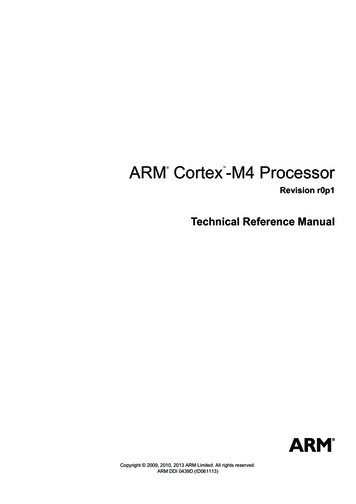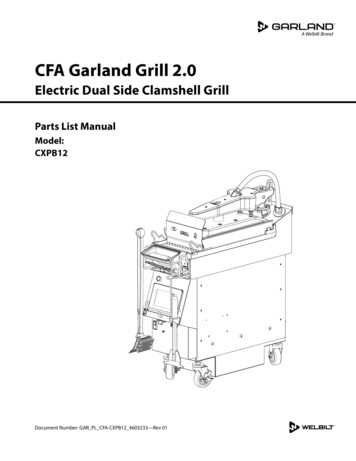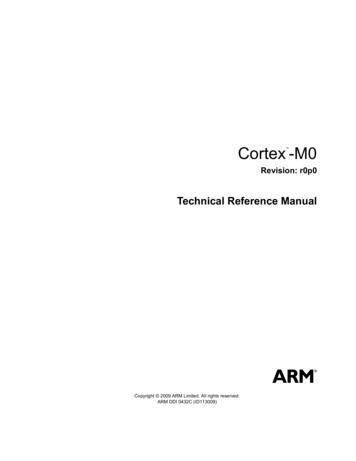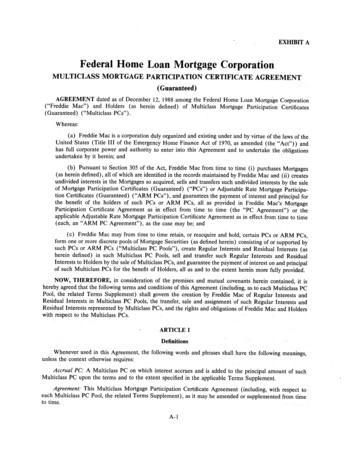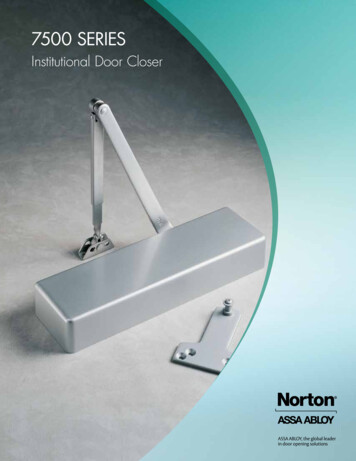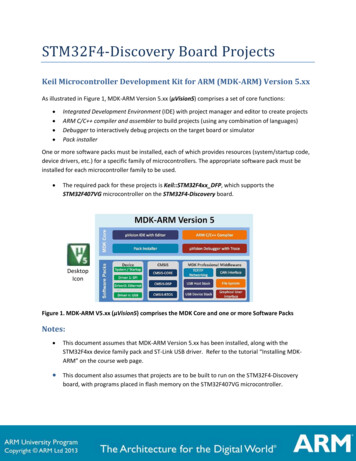
Transcription
Open SystemFirmware/OpenRMCArm SBBR and ServerReadyProgramDong Wei, Arm Fellow, Arm Inc.
Background The Open System Firmware Project is an open source firmware project lead bycontributors, code committers, and a technical steering committee. The goal of this projectis to create and deploy, at scale, an open source hardware platform initialization and OSload firmware optimized for web-scale cloud hardware, including documentation, testing,integration and any other artifacts that aid the development, deployment, operation oradoption of the open source project. Arm ServerReady is a compliance program, based on standards, that allows partners todeploy Arm servers with confidence. It ensures that Arm-based servers work out-of-thebox, offering seamless interoperability with operating systems and software. Arm seeks to collaborate with Open Systems FirmwareOPEN SYSTEMSFIRMWARESpecifications
Why do we need a standards-basedapproach?Arm architecture supports a very diverse variety of devicesDiversity is good, but uncontrolled diversity is bad, particularly for servers Servers are very different to embedded devices – you have to install standard OSs which may even pre-date theSoC Installation process needs to ‘just work’ Modifying the operating to suit the HW is not a viable option, as it is in embeddedServers rely on standards to solve this - Common rules for hardware and forfirmware
SBBR: Server Base BootRequirementsFirmware requirements for Arm based infrastructure SoCsDeveloped in conjunction with the server ecosystemArm Specs PSCISMCCCTF-AArm FFHArm MMRequirements for industry standards and Arm IOSARM TF (PSCI, SMCCC, SDEI )IndustryStandards UEFI ACPIOPEN SYSTEMSFIRMWARE SMBIOS TCG FWspec PCI FWspecSpecifications
Why SBBR In server ecosystem, integration model is mostly horizontal System manufacturers and OS vendors are separate Horizontal integration requires standard firmware interfaces SBBR provides firmware ground rules for BIOS, SoC and ODM/OEM vendorsOPEN SYSTEMSFIRMWAREWhat’s in SBBRSBBR provides guidance for the required interfaces from UEFI Specification ACPI Specification SMBIOS Specification Arm Specifications (PSCI, SMCCC, TF-A, Arm MM, etc.)Specifications
Arm ServerReadyIt’s a set of tests: Architecture compliance test suites for SBSA/SBBRBooting of standard linux distros, WinPE and smoke testsIt’s a compliance process: Partners run the tests, we help debug issuesOnce successful we provide a certificateIt’s a right to marketing materials: Partners can use the logo if they pass the process
SBSA: Server Base System ArchitectureHardware requirements for Arm-basedinfrastructure SoCsArm Arch: Armv8.x-A SMMU GIC Extensions: RAS MPAMDeveloped in conjunction with the server ecosystemArm architecture and system architecture ectureIndustryStandards
Software and Firmware DevelopmentWe participate in important open source projects for server Linux kernel EDK2 for UEFI firmware Trusted Firmware–A – formerly Arm Trusted FW Open BMCWe also work with OS vendors that are not open source.OPEN SYSTEMSFIRMWARE
Compliance tools help in scaling out Like other segments the server ecosystem iscomplex and contains multiple vendorsAn OS vendor cannot check every possible systemCompliance tools can help one vendor check theinput they receive from anothere.g. OEM can check Silicon vendor HW iscompliant with SBSA hardware requirementsOSV can check ODM is compliant with SBSAhardware requirements and SBBR firmwarerequirementsThere is no specification without verificationFor these reasons, we introduced tests for ourspecifications and a compliance programSiliconVendorBIOSVendor ODMOSVendorOEMCloudVendor
ACS: Architectural Compliance mPartnerOSSSBSA hardware requirements (CPU, GIC, SMMU, PCIe )properties SBSA CPU properties SBSA defined system components SBSA rules for PCIe integration– Based on the PCIe specification– Based on standard OS drivers with no quirksenabledSBBR defined FW requirements (UEFI, ACPI and SMBIOS tests) UEFI testing based on the UEFI SCT ACPI testing based on FWTS SMBIOS testingThe test suites are hosted in GitHub and are open source(Apache //github.com/ARM-software/arm-enterprise-acs
TestingWe are engaging with silicon vendors,ODMs, OEMs and BIOS vendors to run thetestsTests are developed by our architectureteam, which also develops thespecificationsWe have a support team that helps inrunning of test, debugging etcOEM/ODM/SiP/IBV runs the testsSupport team SupportsODM/OEM/Siliconvendor or BIOSvendor on runningthe tests andfixing issuesArch Team Develops tests Takes testsreports andprovidescertification
SBBR & OSFSBBR/SBSA are defined in the ArmServer Advisory Committee Formed in 2011 it consists of 43 companies with members fromevery sector server ecosystem (SoC, ODM, OSV,BIOS, ISV, CSP, IP vendors ). Members have an NDA with Arm and can accessspecifications whilst they are in development –helping us to shape the specs. The forum has a mailing list and an issue tracker,monthly meets and yearly events in Asia and theUS. Published SBBR Spec and the ACS areplanned to be Contributed to OCPOPEN SYSTEMSFIRMWARE
Call to Action Collaborate between Arm and OSF to support the OSF workstreams https://github.com/opencomputeproject/OSFOpenEDK2 Project: BoardMtOlympusLinuxBoot: https://www.linuxboot.org/ Provide inputs to future versions of SBBR Where to find additional information (URL links)Where to find the published SBBR/SBSA specs: stem-architecture/server-system-architectureArm ServerReady //github.com/ARM-software/arm-enterprise-acsArm Trusted Firmware-A: https://www.trustedfirmware.org/EDK2 Project: https://www.tianocore.org/
The Open System Firmware Project is an open source firmware project lead by contributors, code committers, and a technical steering committee. The goal of this project is to create and deploy, at scale, an open source hardware platform initialization and OS load firmware optimized for web-scale cloud hardware, including documentation, testing,
